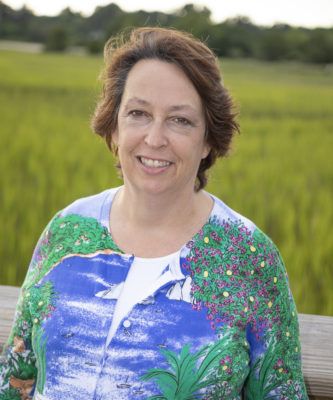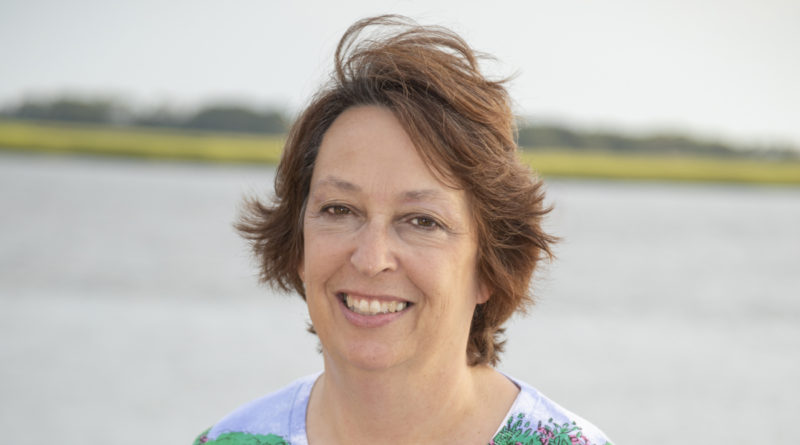Wendy Lacombe
The Art of Education
story by LISA ALLEN photo by PAUL NURNBERG
Regardless of your age, when you meet Wendy Lacombe, you wish she was your teacher. Today. Right now. You know she’s a teacher who changes lives.
Sitting across from her, one basks in her warmth and enthusiasm. When you ask about teaching, her passion for her profession exudes. Yes, she acknowledges, teaching is a tough, frustrating, bureaucratic endeavor in which teachers are forced-fed regulations and requirements that pile up, layer upon layer, dictated with little input from them by the feds, the state, the district and the school. But that’s not what’s important.
“The end game is those kids,” said Lacombe, who teaches senior and AP English and advises the National Honor Society chapter at Beaufort High School. “You have to find the joy and the purpose.”
Teaching, she said, is an art, not a science. “It’s all about the relationship you build with each student. That’s how you reach them.”
In her senior English class, she had her students tackle the question, Edgar Allan Poe: murdered or natural death? They have to read carefully, think critically and argue convincingly. She teaches them to communicate on paper, through presentations and video.
She shows them, doesn’t tell them, that words are powerful.
Working with the Pat Conroy Literary Center, Lacombe and the English department will launch a short-story scholarship program in which students will write their way to college money. Last year, she encouraged the entire school to read the book, “Dear Martin,” before the author Nic Stone held a student workshop.
Outside of school, she volunteers through her church, St. Peter’s Catholic Church.
Even after 30 years in the classroom, her love of teaching hasn’t diminished a bit. To students and colleagues alike, she shares her love of learning. She looks for the good in every new rule or teaching method.
It’s no surprise her peers elected her Teacher of the Year for Beaufort High. In that role, she’ll represent her fellow teachers to the district. She’s in the running for District Teacher of the Year, in which she would represent Beaufort County teachers to the state.
“Every school has its own DNA,” she said. Each school’s needs, each student’s needs, are different.

“Accountability is important, and there needs to be a measure to evaluate job performance. However, the accountability measures we have in place currently, specifically standardized high-stakes group testing, are not productive, useful, or efficient,” she wrote in her essay applying for the role.
The one test for all doesn’t work. “If I was in the cupcake business, yet had no control over my raw ingredients, and I was sent oatmeal, honey, raisins, and yogurt, I might make a great dessert, but it probably wouldn’t be a cupcake,” she wrote.
If a ninth-grade teacher has a student who starts the year off reading at a fourth-grade level, he can make great strides, but no matter how gifted the teacher, he will not move five levels in a year.
“Success needs to be measured by the individual gains a student makes in the classroom, measured by pre-tests and post-tests,” she argues.
Another educational challenge in Beaufort County is the disparity between the beginning pay of about $35,000 and the local cost of living. “If you just graduated from college with students loans and are looking at $1,200 a month for a basic place to live, you’re barely going to have enough money left over for groceries.”
Schools have to focus on recruitment and retention. Turnover is high, one year hitting nearly 40 percent at Beaufort High.
“If wealth were determined by coffee mugs, candles, school spirit t-shirts, and Christmas ornaments, I would be up there with Oprah,” she wrote. But that isn’t how the world works.
“Teaching is a noble profession. Teachers are people with huge hearts and big dreams who clearly do not go into the profession for the money. They go into this profession because they want to make a difference and leave this world a better place than when they found it. When we fight for teachers, we’re really fighting for students.”
Schools are expected to solve society’s problems. They feed, clothe, counsel, advise, protect, and somewhere in there, teach.
Lacombe’s disappointed the SC Legislature didn’t pass the Teachers Bill of Rights this year, which would have required schools to give teachers a 30-minute lunch break, limit class size, raise pay and reduce testing.
Despite the pressures and frustrations, Lacombe maintains a positive attitude and boosts her colleagues, too.
She concluded her essay with gratitude.
“To my fellow teachers, I appreciate you, and I know that we can make this profession better. It is time to work together with our administrators to make changes where we need them, make our voices heard for the good of our students, and share our joyful moments. If we are joyful in our profession, especially if our students get that message, then we will recruit and retain teachers.”
That’s the end game: excellent teachers change the world.
Don’t you wish you had had Mrs. Lacombe for senior English?




